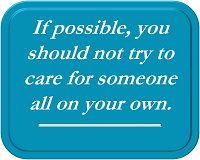Getting Help
Caregiver Choices©
Who is a Caregiver?
Understanding Your Feelings
Getting Help
Taking Care of Your Loved One
Planning Ahead
Understanding Lung Cancer
Treatment for Lung Cancer
Lung Cancer Health Care Team
Questions for the Health Care Team
Prognosis
Key Decision Points in Care
Conclusion
Caregiver Resources
Afterword
About the Authors
About the Editors
Acknowledgments
Caregiver Choices© Menu
A strong and positive relationship between you as a caregiver and the person with lung cancer can grow in many ways. The beginning is often one of the most challenging parts. Reaching out and asking someone for help can be hard for many people diagnosed with lung cancer, even when they are quite sick and know they could use some support. Now that you have started this caregiver relationship, you both may be tempted to keep your support circle small, to avoid more of the uncomfortable “starter” conversations. Yet, if possible, making efforts to expand your community of caregivers can be so valuable for you and the person with cancer.
 As we note in this guide, people with lung cancer need many different types of care, and they appreciate many kinds of support throughout their journey. Even if you have unlimited time, resources, and energy, it is unlikely that you are the best or only person to provide each kind of care and each sort of support at the moment it is required. People with lung cancer find themselves in a world that has been turned entirely upside down. One of the key difficulties is simply finding their way through this new, unfamiliar, and unwelcome world. As a caregiver, one of the first things that you can do is help that person decide what kind of help they need and who might be able to provide it.
As we note in this guide, people with lung cancer need many different types of care, and they appreciate many kinds of support throughout their journey. Even if you have unlimited time, resources, and energy, it is unlikely that you are the best or only person to provide each kind of care and each sort of support at the moment it is required. People with lung cancer find themselves in a world that has been turned entirely upside down. One of the key difficulties is simply finding their way through this new, unfamiliar, and unwelcome world. As a caregiver, one of the first things that you can do is help that person decide what kind of help they need and who might be able to provide it.
Making a basic list of ways in which others can give support and matching the right people with the right sort of assistance will let you reach out to them and will help you respond when others contact you. You and the person you are caring for may find that people around you appear with true but vague offers to help. You may frequently hear others say something like, “if there is anything I can do, please let me know.” Such offers are heartfelt, and we encourage you to accept them all! If you have thought this out beforehand (remember that list?), it will let you consider the offers and talk about them in a way that is comfortable for everyone involved. Such planning will allow you to accept these offers graciously and in a way that gets things done.
If possible, you should do your best to avoid a situation in which you are the only person giving all the various types of support to the person with cancer. Just expanding your community of caregivers is likely to benefit the person with lung cancer more than any other single thing you do. If the person with cancer resists asking others for help, you should certainly respect their feelings. However, it is best if you can convince him or her that bringing others into the fold is in everyone’s best interest.
Help the person you are caring for put together a large group of caregivers who are onboard and have different strengths and the shared goal of helping their friend or family member or coworker or acquaintance or neighbor through the lung cancer journey. Bringing this community together will help the person coping with lung cancer and give much needed support to you as a caregiver.
